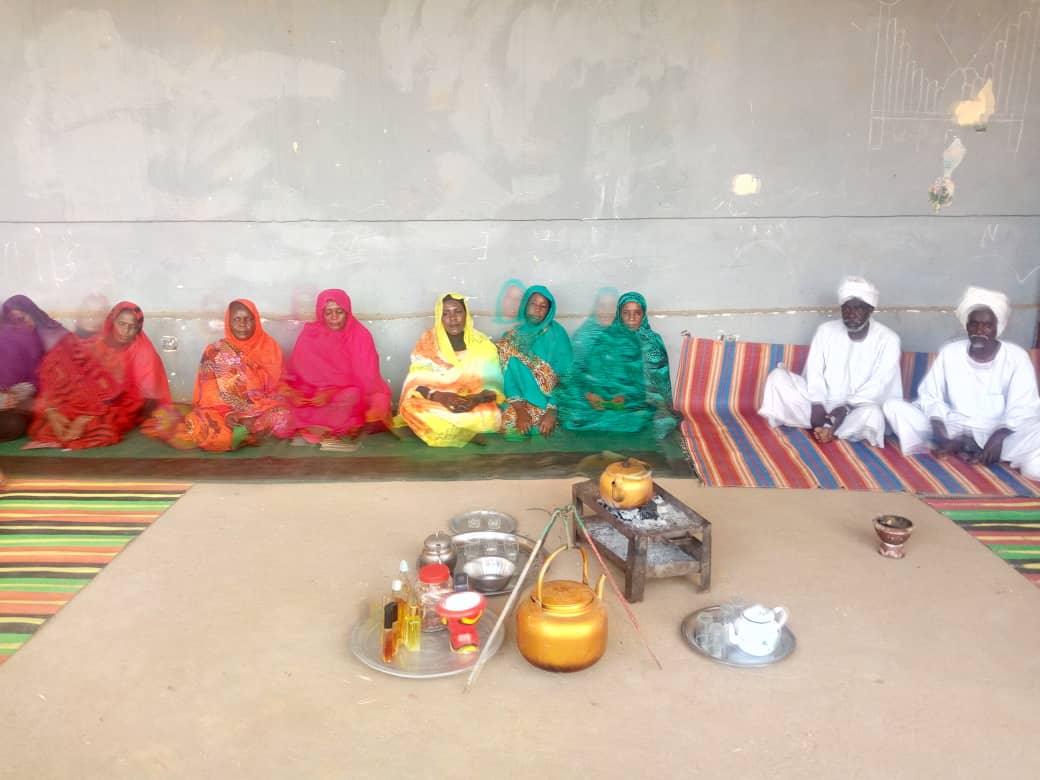(14) ALbaramka council
Social Practices, in West Darfur state / Central Darfur state / South Darfur state / East Darfur state / North Darfur state / West Kordofan state / South Kordofan state / North Kordofan state | Nationally recognized
The Baramka council is a form of traditional and social practice that characterizes the Baqara (cowboy-grazing tribes) in Darfur and Kordofan, Western Sudan, where meetings are held specifically to drink tea in a ceremonial setting accompanied by singing and poetry that mostly glorify tea.
Tea is considered to be one of the most praised hot drinks in Sudan, especially in western Sudan(Darfur and kordofan). it has become an essential part of people's lives, and they have set up lyric councils known as Bramaka councils where praise is given to it.(Mashkar) Tea and singing in virtuous values, and Bermakah means generosity; It is a Persian term that means the person who set fire to honor the guest, their history dates back to the Abbasi era; Yahya al-Barmaka, who was minister of Harun al-Rasheed, was best known.
The structure of the baramka council:
-Nazer (beholder): Al-Nazir represents the top of the organizational pyramid of the Baramka Council and chairs the session.
-Modeer(manager): the manager is the one who runs the tea cups in a strict system that no one is allowed to bypass regardless of the position or status.
-council judge: is the only one whose rule applies to the beholder, even though he is subordinate to him.
-Khafeer(sentry): He's the cop who carries out the orders, arrests and receives the fines.
-Inspector: He is the one who inspects the conditions of the baramka, ensures that they comply with the law and presents the (violator) to trial.
-Lawyer: One of the recently created jobs in the Baramka Council, his role is to defend the accused and try to lift or commute the sentence, this job is not assigned to a particular person, but everyone can be a lawyer for their friend, brother or neighbor and so on.
-Queen: The highest female authority in the women's component of the Baramka Council .the participation of women, starts with the queen Alsheikha and then the Queen of the queens.
Objectives of the baramka council:
The Baramka Council is convened not to drink tea only, but the main purpose is social communication, where there are four cases of the council meeting:
Fun and extroversion council
Good endeavors council (reconciliation )
Trial council
Celebration council, big event
Poetical purposes for the baramka council:
Baramka’s poets praises great, generous men with historic victories, along with chaste women who preserve the traditions which are called (Fanjareyat). And vilify women who jump over traditions and costumes barriers.
Council rules and regulations:
Baramka councils have rules and regulations in drinking tea, and patterns of behavior controlling their council, and anyone who goes out of or breaks the circle of those laws is held by a deterrent trial board. That is, no member of the Council has the right to bypass it in any way.
And in case of doing so, breaking the law, the individual will be tried according to a popular judicial system; his punishments reach the point of being rejected by society.
For example, its forbidden for baramka to eat their food in the market, specially women. And wearing dirty clothes, being in places that are inappropriate for the responsible men, or places around which suspicion revolve.
One of the most distinguishing features of Al-Baramkeh is their respect for women, the elderly and children.
The head of Baramkeh Taher Al-Swar Deputy Director of Baramkeh Managers in South Darfur says: (46) case is being considered in the Baramkeh Council, including (20) violations within the council, (26) violations outside the council. Where the accused from outside the council is summoned to appear before Al-Baramkeh in their council
Tea is considered to be one of the most praised hot drinks in Sudan, especially in western Sudan(Darfur and kordofan). it has become an essential part of people's lives, and they have set up lyric councils known as Bramaka councils where praise is given to it.(Mashkar) Tea and singing in virtuous values, and Bermakah means generosity; It is a Persian term that means the person who set fire to honor the guest, their history dates back to the Abbasi era; Yahya al-Barmaka, who was minister of Harun al-Rasheed, was best known.
The structure of the baramka council:
-Nazer (beholder): Al-Nazir represents the top of the organizational pyramid of the Baramka Council and chairs the session.
-Modeer(manager): the manager is the one who runs the tea cups in a strict system that no one is allowed to bypass regardless of the position or status.
-council judge: is the only one whose rule applies to the beholder, even though he is subordinate to him.
-Khafeer(sentry): He's the cop who carries out the orders, arrests and receives the fines.
-Inspector: He is the one who inspects the conditions of the baramka, ensures that they comply with the law and presents the (violator) to trial.
-Lawyer: One of the recently created jobs in the Baramka Council, his role is to defend the accused and try to lift or commute the sentence, this job is not assigned to a particular person, but everyone can be a lawyer for their friend, brother or neighbor and so on.
-Queen: The highest female authority in the women's component of the Baramka Council .the participation of women, starts with the queen Alsheikha and then the Queen of the queens.
Objectives of the baramka council:
The Baramka Council is convened not to drink tea only, but the main purpose is social communication, where there are four cases of the council meeting:
Fun and extroversion council
Good endeavors council (reconciliation )
Trial council
Celebration council, big event
Poetical purposes for the baramka council:
Baramka’s poets praises great, generous men with historic victories, along with chaste women who preserve the traditions which are called (Fanjareyat). And vilify women who jump over traditions and costumes barriers.
Council rules and regulations:
Baramka councils have rules and regulations in drinking tea, and patterns of behavior controlling their council, and anyone who goes out of or breaks the circle of those laws is held by a deterrent trial board. That is, no member of the Council has the right to bypass it in any way.
And in case of doing so, breaking the law, the individual will be tried according to a popular judicial system; his punishments reach the point of being rejected by society.
For example, its forbidden for baramka to eat their food in the market, specially women. And wearing dirty clothes, being in places that are inappropriate for the responsible men, or places around which suspicion revolve.
One of the most distinguishing features of Al-Baramkeh is their respect for women, the elderly and children.
The head of Baramkeh Taher Al-Swar Deputy Director of Baramkeh Managers in South Darfur says: (46) case is being considered in the Baramkeh Council, including (20) violations within the council, (26) violations outside the council. Where the accused from outside the council is summoned to appear before Al-Baramkeh in their council

